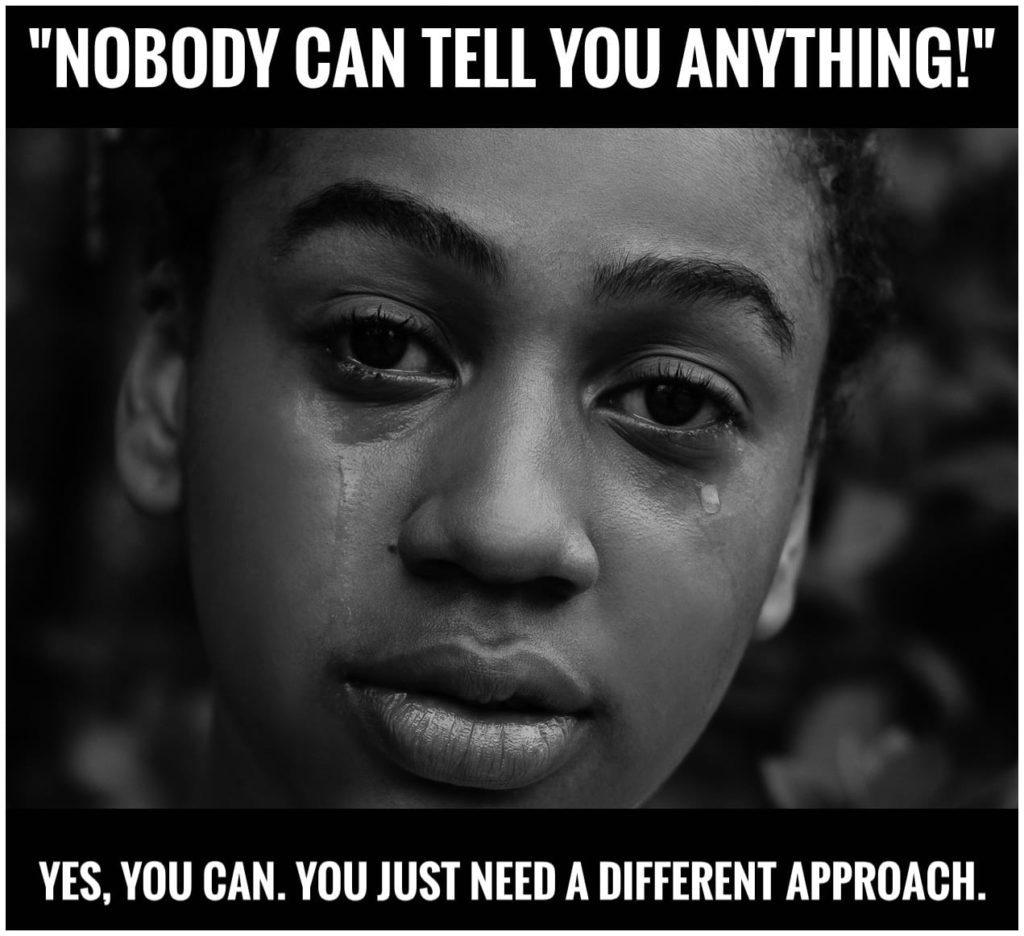“Nobody Can Tell You Anything!” – Yes, You Can. You Just Need a Different Approach

I feel like this is a common argument and misunderstanding between neurotypical and autistic people, and it goes a little something like this:
The autistic person says or does something deemed socially inappropriate by the neurotypical people around them. Their family member, partner, friend, etc., gets embarrassed and tells the autistic person how they feel about what happened. The autistic person begins to cry, explain themselves, and/or have a meltdown.
The NT person, feeling totally unheard and unacknowledged, gives up and claims that they cannot explain their feelings or thoughts because it always leads to a meltdown of some sort.
The NT person (quite mistakenly) believes that the ND person is exaggerating their emotional response to avoid confrontation or switch blame, and that NT person also believes they will have to always swallow their wants and needs because their wants and needs cause meltdowns.
(Article continues below.)
The best way to improve communication with your autistic loved one is to understand how your autistic loved one’s mind works! Intentions, motivations, and personal expressions (facial expressions or lack thereof, body language, etc.), are often quite different in autistic people than they are in neurotypical people.
Experience a better understanding of your autistic loved one by reading books about life from an autistic perspective as well as stories that feature autistic characters. You’ll have so many “Ah ha!” moments and start seeing your autistic loved one in a different light (and you’ll have a better understanding of their behaviors, which you may have been misinterpreting up until now).
Books I recommend for a better understanding of your autistic loved one:
No. That’s not true. I do understand why you think that, but that’s not what’s happening. It’s not the want or the need that’s causing the meltdown or shutdown, it’s the NT person’s approach to voicing those wants and needs that causes the issue.
See, everyday life for an ND person is stressful and anxiety-inducing. Literally, just existing. Now, add a social event, you get even more anxiety, add an irritated loved one, still more anxiety, then add a person raising their voice in frustration and making assumptions about the “purposeful” intentions of the ND person, and you have a recipe for a shutdown or meltdown.
For most of us ND folks, anxiety STARTS OUT at a 5 out of 10 every day just from waking up. By contrast, NT folks probably start from a 0 to 2 anxiety level on an average day.
That said, our anxiety and discomfort can get to 10 really quickly and stay there.
Think of the last time you were highly anxious.
You woke up late, got in the shower, the knob broke off, you doused yourself in freezing cold water, you burnt yourself making breakfast, tripped over the cat for the 15th time that week while carrying your screaming child out to the car, nearly got into an accident when some jerk cut you off in traffic, called a plumber to find out what it will cost to replace your shower knob, and nearly caused your own car accident when you heard it would be $500.
Would that moment, when you’re dragging yourself into the office, about to cry, be a good time for your co-worker to tell you she’s been feeling neglected lately because you haven’t invited her out to lunch in a week, and she thinks you’re mad at her?
No. Probably not.
Now, imagine being in that state of anxiety, or something close to it, all the time. How would you need someone to approach you?
Here’s my formula for NTs:
1) Think for a minute about the interaction. Was the slight intentional?
2) Approach the ND person in a calmer, more relaxed environment. (Not during the car ride home, for example–we’re trapped in there with you!)
3) Tell your ND loved one you have something important you want to talk with them about. Make sure you have their full attention.
4) Explain what you think went wrong, how you felt, WHY it was wrong (never skip the why, we need to know why or we will not make the connection), and what you would have preferred happened instead.
5) Check for understanding by asking your ND loved one to explain, in their own words, what they took from the conversation.
Now, ND folks, we have work to do, too. If an NT person is approaching you in this fashion, here’s the most effective way to receive it:
1) Breathe. Stay as present as possible. Remember, this person is NOT trying to hurt you. You are not in danger.
2) Listen. Take in everything that the person is saying and believe that they are telling the truth as they experienced it. Resist the urge to interrupt with questions.
Edit for a very important clarification: Listen to what the person is saying without interrupting for the first few minutes so they feel heard, THEN ask questions. Some people were taking it that I meant listen without any question or objection at all. No. Also, ND people absolutely MUST ask and understand why, so there will be questions, but stopping to acknowledge feelings can help decrease escalation, not escalate it.
3) When the person is done explaining their thoughts and feelings, ask questions for clarification if need be.
NT people, you have to allow and answer questions if you’re to have an effective dialogue. We have to know why and understand specifics if we are to connect with what you’re saying.
4) If you cannot, at that moment, process what the other person is saying to you, tell them right away. No sense listening if you can’t process the information due to fear or sensory overload.
5) Suggest a time to talk instead, set an alarm, prepare yourself emotionally, talk at that time.
It’s not an exact science, but it should help you through the rough patches.
Follow me on Instagram.
Want downloadable, PDF-format copies of these blog posts to print and use with your loved ones or small class? Click here to become a Patreon supporter!







Where can I find advice on how to communicate and encourage a high functioning autistic, adult family member to have better hygiene?
He showers extremely infrequently and smells, rewears the same clothing day after day, and just throws trash on the floor of his room, which stinks and has mold, and leaves dirty dishes around for others to put away.
I’ve asked him if showers are an painfully or irritating stimulus thing, but he said no.
Often, he gets angry if asked to shower.
One time, I invited him on a trip, and he didn’t even pack any soap or toothpaste and toothbrush.
Thank you.
Just so you’re aware, the term “high-functioning” is not accurate and is harmful to the autistic community. The better term is “low support needs”. As far as hygiene goes, there could be a number of reasons your autistic loved one struggles with this. Does he have a PDA profile (pathological demand avoidance or persistent demand for autonomy)? If so, being asked to do something can instant feelings of anxiety and overwhelm. Does he also have ADHD? Things often blend into the background for people with ADHD, and even though they are surrounded by a lot of empty cans, food containers, etc., they no longer see them. This could be another issue. I’d like to help further if I can. I offer private consultations, if you need more comprehensive advice.
Here is the link: https://www.thearticulateautistic.com/private-consultation-translation-autistic-adult/